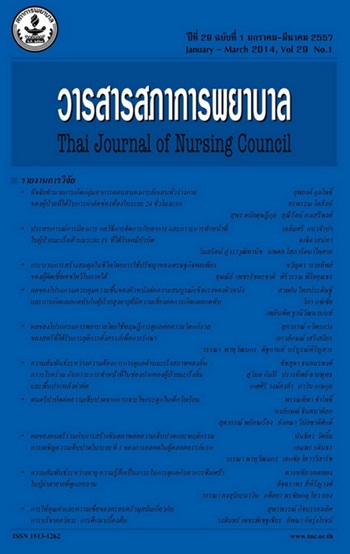ประสบการณ์การมีอาการ กลวิธีการจัดการกับอาการ และภาวะการทำหน้าที่ในผู้ป่วยมะเร็งเต้านมระยะ IV ที่ได้รับเคมีบำบัด
Keywords:
ประสบการณ์การมีอาการ กลวิธีการจัดการกับอาการ ภาวะการทำหน้าที่ มะเร็งเต้านมระยะ IV Symptom experiences, Symptom management strategies, Functional status, Breast cancer Stage IVAbstract
บทคัดย่อ: วัตถุประสงค์ของการวิจัย: เพื่อศึกษาประสบการณ์การมีอาการในมิติความถี่ ความรุนแรง ความทุกข์ทรมาน/รบกวนการดำเนินชีวิต และความสัมพันธ์ระหว่างประสบการณ์การมีอาการในมิติความทุกข์ทรมานที่รบกวนการดำเนินชีวิตกับภาวะการทำหน้าที่ในผู้ป่วยมะเร็งเต้านมระยะ IV ที่ได้รับเคมีบำบัด
การออกแบบการวิจัย: การวิจัยเชิงบรรยายหาความสัมพันธ์
การดำเนินการวิจัย: กลุ่มตัวอย่างเป็นผู้ป่วยมะเร็งเต้านมระยะ IV ที่ได้รับเคมีบำบัดแบบผู้ป่วยนอกโรงพยาบาล
ศิริราช ตามเกณฑ์ที่กำหนดจำนวน 85 ราย เก็บข้อมูลโดยให้ผู้ป่วยตอบแบบสัมภาษณ์จำนวน 4 ฉบับ ได้แก่ 1) ข้อมูลส่วนบุคคล
2) ประสบการณ์การมีอาการ 3) กลวิธีการจัดการกับอาการ และ 4) ภาวะการทำหน้าที่ วิเคราะห์ข้อมูลด้วยความถี่ ร้อยละ ค่าเฉลี่ย ส่วนเบี่ยงเบนมาตรฐานและ สัมประสิทธิ์สหสัมพันธ์เพียร์สัน
ผลการวิจัย: ผู้ป่วยมะเร็งเต้านมระยะ IV มีประสบการณ์อาการนอนไม่หลับ/นอนหลับยากมากที่สุด ร้อยละ 76.5 โดยอาการปวดมีความถี่และความทุกข์ทรมาน/รบกวนการดำเนินชีวิตมากที่สุด อาการบวมบริเวณแขนเป็นอาการที่มีความรุนแรงมากที่สุด อาการที่ทำให้ทุกข์ทรมาน/รบกวนการดำเนินชีวิต 5 อาการ ได้แก่ อาการปวด ปวดตามข้อ นอนไม่หลับ/นอนหลับยาก ไอและอ่อนเพลีย/เปลี้ย/ไม่มีแรง การรับประทานยามีประสิทธิภาพที่สุดในการจัดการกับอาการปวด ปวดตามข้อ นอนไม่หลับ/นอนหลับยากและไอ ส่วนฟังเทปธรรมะมีประสิทธิภาพที่สุดในการจัดการกับอาการอ่อนเพลีย/เปลี้ย/ไม่มีแรง ประสบการณ์การมีอาการมีความสัมพันธ์เชิงลบกับการทำหน้าที่โดยรวม ได้แก่ น้ำหนักลด (r = -0.331) เบื่ออาหาร (r = -0.278) ไอ (r = - 0.265) การรับรสอาหารเปลี่ยนแปลง (r = -0.247) นอนไม่หลับ/นอนหลับยาก (r = -0.235) หายใจไม่อิ่ม/หายใจตื้น (r = -0.207) และปวดตามข้อ (r = -0.188) ตามลำดับ
ข้อเสนอแนะ: พยาบาลและบุคลากรทางสุขภาพควรมีการประเมินอาการที่เกิดขึ้นในมิติต่างๆ โดยเฉพาะอาการที่มีความสัมพันธ์กับการทำหน้าที่ และแนะนำวิธีการจัดการกับอาการที่มีประสิทธิภาพ
Abstract: Objective:To examine breast cancer patients’ experiences in terms of frequency, intensity and suffering/disrupted way of life, and the relationship between their symptom experiences concerning suffering/disrupted way of life and functional status. Design:Interrelationship descriptive research. Implementation:The sample consisted of 85 stage-IV breast cancer patients receiving chemotherapy at the out-patient department of Siriraj Hospital. To collect data, each patient was asked to answer four questionnaires, namely, (i) personal information; (ii) symptom experiences; (iii) symptom management strategies; and (iv) functional status. The data were statistically analysed according to frequency, percentage, mean, standard deviation and Pearson’s Correlation Coefficient. Results:The most frequent symptom experiences encountered by the breast cancer patients studied were insomnia/sleeplessness (76.5%). Pain was identified as causing the greatest suffering and as most frequently and most severely disrupting their ways of life, whilst arm swelling was identified as causing the most intense pain.The five symptoms identified by the patients as causing suffering or disrupting their ways of life were pain, arthritic pain, insomnia/sleeplessness, coughing and lethargy (lack of energy). Oral medication was identified as the most effective way of coping with pain, arthritic pain, insomnia/sleeplessness and coughing, whilst listening to religious sermons was considered the most effective strategy against lethargy.Finally, the symptom experiences displaying a negative relationship to functional status included weight loss (r = -0.331), loss of appetite (r = -0.278), coughing (r = - 0.265); change in gustation (r = -0.247), insomnia/sleeplessness (r = -0.235), shortness of breath (r = -0.207) and arthritic pain (r = -0.188), respectively. Recommendations:Nurses and healthcare personnel are recommended to perform multi-dimensional assessment of patients’ symptoms, particularly those related to their functional status, and to advise the patients on effective symptom management strategies.








